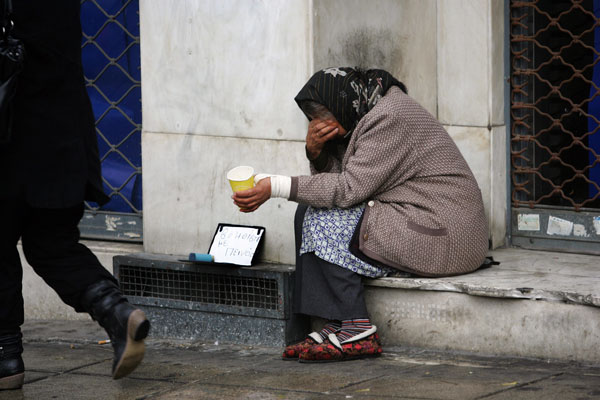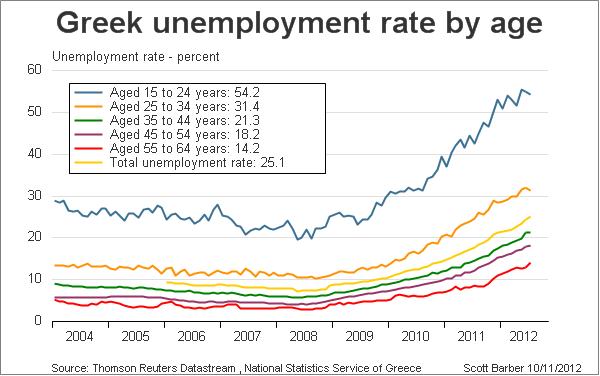With less than a days notice the European Commission has effectively vetoed a new anti-poverty law that was due to be voted on in the Greek parliament today. The new law, known as the “humanitarian crisis bill”, authorised the provision of free electricity for some households, as well as measures to address poverty among pensioners and homeless families.
Because of the ramshackle Greek tax collection system it has been common practice in Greece to collect a range of taxes via household electricity bills. As part of the Troika imposed austerity program the Greek government was instructed to impose new property taxes which were to be collected, along with other taxes, via the household electricity bills. As the economy collapsed and unemployment soared more and more households were unable to afford the combined electricity and tax bills and as a result their electricity supplies were cut off. By 2013 a 1000 households a day were having their electricity cut off and it became a common sight to see people foraging for wood to burn to try to heat their homes.
The bill today was due to fulfil a Syriza election pledge to reconnect the electricity to all those homes. The cost of such an action is, the by the standards of government and eurozone finances, vanishingly trivial.
The anti-poverty bill that was due to go before the Greek parliament today also contained measures to address poverty among pensioners and homeless families. One in four Greeks are unemployed and in some poorer neighbourhoods the unemployment rate is over 75%. The jobless only receive monthly benefits of 360 euros for the first 12 months they are not working. As a result, only 15 percent of Greece’s almost 1.4 million unemployed are currently receiving financial assistance from the state and provision of free medical care to the unemployed has also been cut. State pensions have been reduced by 25% since 2010.
In 2013 a Unicef report said that 439,000 children in the country, those living in the 20.1% of Greek households now below the poverty line, are often underfed and living in very poor conditions.
The poverty threshold takes in to consideration the minimum income that a family of four people must earn every month in order to pay for accommodation and basic requirements such as food, transport, clothing and education. Of this fifth of Greek families, 21.6% have a diet that is lacking in animal protein, 37.1% do not have adequate heating in their homes, 27.8% live in damp conditions and 23.3% in what are defined “poor environmental conditions”. Although official estimates suggest that 21% of Greeks live in poverty, and therefore have a monthly income below 470 euros per month, the real level has already reached (and perhaps exceeded) 25%, meaning that one in four Greeks is poor. In other words, out of 11.2 million Greeks, 2.8 million do not have enough money with which to live.
Greek poverty, and the austerity program, is killing people. A report in Lancet (“Mortality and the economic crisis in Greece.” Lancet 2014; 383: 691) says that in 2012, there were 116,670 deaths in Greece, the highest number since 1949. The 2008-12 rise in the number of deaths is attributed to the increase in the number of deaths in the oldest individuals, with 125% and 243% increases in people aged 80-84 years and older than 85 years, respectively. Although deeper investigation into changes in cause-specific mortality rates is needed, this trend is probably related to barriers to access health care for chronically ill patients because of the drastic restrictions in health policies and the increase in uninsured individuals.
Syriza’s strategy consists of three legs. One was to reform the Greek political system (clamping down on tax avoidance and corruption for example), another was to try to restructure Greek debt so that it became possible to grow the economy again, and the final one was to implement an emergency humanitarian program to try to reduce the human suffering caused by the austerity program.
The European Commission has decided to to try to block the ant-poverty program because it says it is a violation of the compromise deal signed by finance minister Yanis Varoufakis on 20 February in Brussels.
Declan Costello, director at the EC’s directorate for economic and financial affairs, has written to the Greek government, see below, ordering it not to pass the ant-poverty legislation. A planned law to allow tax arrears to be paid in instalments, set before the Greek parliament on Thursday, has also been vetoed.
Mr Costello’s letter says:
“During our teleconference last night, you mentioned the planned parliament passage tomorrow of the ‘humanitarian crisis’ bill. We also understand that other policy initiatives, including the instalment scheme law, are in train that are to go to parliament shortly.
“We would strongly urge having the proper policy consultations first, including consistency with reform efforts. There are several issues to be discussed and we need to do them as a coherent and comprehensive package.
“Doing otherwise would be proceeding unilaterally and in a piecemeal manner that is inconsistent with the commitments made, including to the Eurogroup as stated in the February 20 communique.”
We will find out later today whether the Greek government had decided to postpone the new laws or defy the Troika.
UPDATE:
The Greek parliament passed the anti-poverty programme and the European Commission is back peddling furiously claiming they never wanted the legislation delayed.



Excellent. I got good informations regarding to Greece debt crisis.
Comments on this entry are closed.